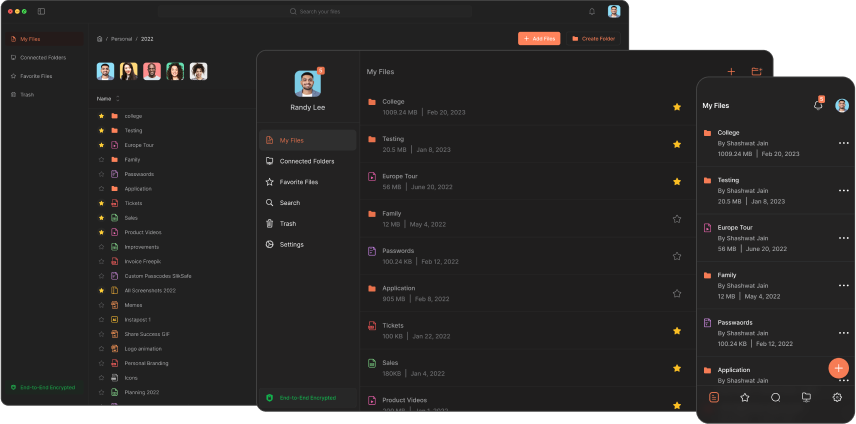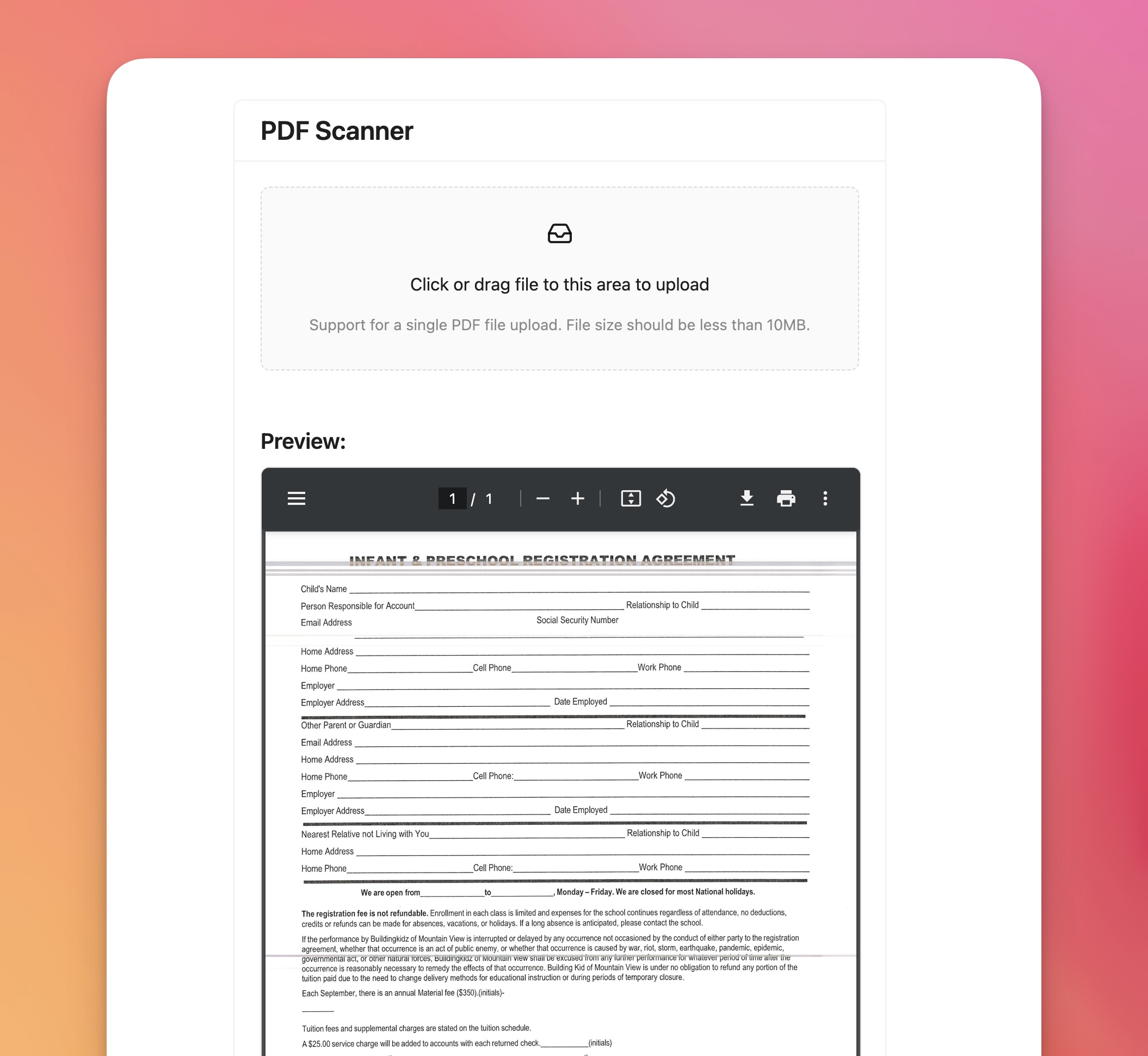Scan To PDF
Scan your files using AI and remove the background.Click or drag file to this area to upload
Support for a single PDF file upload. File size should be less than 10MB.
Scan Text to Translate: A Comprehensive Guide
In the ever-evolving digital age, the ability to quickly and accurately translate scanned text is becoming increasingly essential. Whether you're dealing with foreign-language documents, signs, or handwritten notes, the right tools can simplify the task of translating text from images. In this comprehensive guide, we'll explore everything you need to know about scanning text to translate, including the best tools, methods, and tips to improve your workflow.
Why Scan Text to Translate?
Scanning text to translate offers several benefits that can enhance your productivity and streamline your tasks:
- Efficiency: Quickly translate large volumes of text without manual entry.
- Accuracy: Leverage advanced OCR (Optical Character Recognition) technology to accurately capture and translate text.
- Convenience: Easily translate text from printed materials, photographs, or digital screens.
- Accessibility: Make foreign-language content more accessible to a broader audience.
Best Tools for Scanning Text to Translate
Several tools and applications offer robust solutions for scanning and translating text. Here are some of the most popular options:
1. Google Translate
Google Translate is a widely-used and powerful translation tool that includes a feature for translating text from images. Available on both Android and iOS, it supports over 100 languages and offers real-time translations.
Key Features:
- Real-time translation using the camera
- Supports handwriting and voice translation
- Offline translation capabilities
Step-by-Step Guide:
- Download and Install: Get the Google Translate app from the Play Store or App Store.
- Open the App: Launch Google Translate on your device.
- Select Camera Icon: Tap the camera icon to activate the camera mode.
- Capture Text: Aim your camera at the text you want to translate and take a picture.
- Select Text: Highlight the text you want to translate by swiping your finger over it.
- View Translation: The app will automatically translate the highlighted text into the desired language.
2. Microsoft Translator
Microsoft Translator is another robust tool that offers text translation from images. It supports over 70 languages and is available on Android, iOS, and Windows.
Key Features:
- Image translation by scanning photos
- Multi-device conversation translation
- Phrasebooks for offline usage
Step-by-Step Guide:
- Download and Install: Get Microsoft Translator from the Play Store or App Store.
- Open the App: Launch Microsoft Translator on your device.
- Tap Camera Icon: Press the camera icon on the main screen.
- Capture Text: Focus on the text you wish to translate and take a picture.
- Select Text: Highlight the necessary portion of the text.
- Translate: The app will translate the selected text into the language you've chosen.
3. Adobe Scan and Adobe Acrobat Reader
Adobe Scan and Adobe Acrobat Reader offer a combined solution for scanning and translating text from documents. Adobe Scan converts documents into PDFs, which can then be translated using Adobe Acrobat's OCR capabilities.
Key Features:
- High-quality document scanning
- OCR text conversion in PDFs
- Integration with other Adobe tools
Step-by-Step Guide:
- Download and Install Adobe Scan: Available on the Play Store and App Store.
- Scan Document: Open Adobe Scan and capture the document.
- Save PDF: Save the scanned document as a PDF.
- Open in Adobe Acrobat Reader: Download Adobe Acrobat Reader and open the saved PDF.
- OCR Conversion: Use the OCR feature to convert the scanned text into editable content.
- Translate Text: Select the text and use a translation tool to translate the converted text.
Tips and Best Practices
To ensure a smooth and efficient process when scanning and translating text, follow these best practices:
1. Ensure Good Lighting and Clarity
When capturing text with your camera, ensure that there's adequate lighting and that the text is clear and legible. Blurry or poorly-lit images may hinder the OCR and translation process.
2. Check for Language Support
Make sure the tool you are using supports the languages you need to translate. Different tools offer varying levels of language support.
3. Edit and Proofread
After translation, always proofread the output for accuracy and context. Automated translations may sometimes produce errors.
4. Use Offline Features
When traveling or in areas with limited internet access, consider using tools that offer offline translation capabilities.
5. Maintain Security and Privacy
Ensure that sensitive or personal documents are handled securely, especially if using online tools or cloud storage.
Troubleshooting Common Issues
Despite the advantages, you may encounter some issues when scanning and translating text. Here are a few troubleshooting tips:
1. Inaccurate Text Capture
If the OCR isn't capturing text accurately, try adjusting the lighting, or using a higher-quality camera.
2. Translation Errors
Automated translations can sometimes be inaccurate. Verify translations with a human translator if precision is crucial.
3. Unsupported Languages
If your required languages are not supported by a particular tool, try alternative tools that offer broader language support.
4. Large Documents
For extensive documents, use batch processing features where available, to save time and effort.
Conclusion
Scanning text to translate it opens up a world of possibilities, making information accessible, breaking language barriers, and enhancing productivity. With tools like Google Translate, Microsoft Translator, and Adobe Scan, the process becomes easier and more efficient. By following the steps and best practices outlined in this guide, you can confidently navigate the world of text translation and make the most of the available technology.
Further Reading
- Understanding Optical Character Recognition (OCR)
- Tips for Effective Translation
- Comparison of Translation Tools
By leveraging these tools and insights, you can make better decisions and achieve more accurate results in your translation tasks. Happy translating!
Download Now
The Slikest Files Experience Ever Made

